Henry Cloud's Blog, page 14
June 20, 2017
Why Teens Should Get Angry with Parents
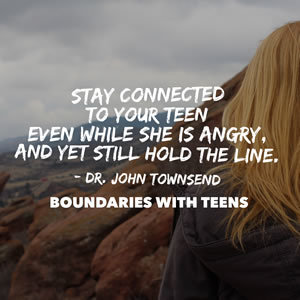 Adolescents get angry a lot. They live in protest mode, so it is second nature for them to get mad at everything in the world, especially their parents. But some parents are conflict-phobic — they are uncomfortable and afraid of being the object of their teen’s wrath, and so they avoid setting boundaries with teens.
Adolescents get angry a lot. They live in protest mode, so it is second nature for them to get mad at everything in the world, especially their parents. But some parents are conflict-phobic — they are uncomfortable and afraid of being the object of their teen’s wrath, and so they avoid setting boundaries with teens.
However, this teaches adolescents that if they throw a tantrum, they can get out of a limit. Teens who learn this will also have difficulty experiencing healthy adult relationships. To help your child avoid this relational future, you’ll want to teach him to accept responsibilities in relationships without having outbursts.
Many parents who fear their teen’s anger have either had little experience in dealing with anger or had some very negative experiences. Whichever the case, these parents have few tools to deal with angry people, so they avoid confronting them because it’s too uncomfortable.
If this is your struggle, in addition to fearing your teen’s anger, you may also fear the strength of your own anger. To resolve this fear, learn to experience and normalize anger — your own and others’ — as a part of life. Make this an intentional item of growth for yourself.
You can get used to angry feelings by dealing with them in your own supportive relationships. Tell others about your discomfort with anger, and practice expressing your anger in safe relationships. Also learn how to listen while others express their anger. Instead of panicking or fearing the worst, focus on what the person has to say and then have a conversation about it. The book, How to Have That Difficult Conversation, may be a good resource for helping you learn how to have healthy, confrontational conversations so that you can work through your fear of anger.
If your teen is never angry with you, you’re probably doing something wrong! So let your teen get mad at you, and stay present with her, as long as she is in some sort of control of herself. Remind yourself that when parents hold to the established limits, adolescents respond in anger. This is normal. If you can stay with your teen’s anger and still love her while holding the line, she can more readily learn to give in and let go of her anger, which is a major step toward maturity. The task is to stay connected to your teen even while she is angry, and yet still hold the line. With this approach, she can more readily accept your limit and give up her angry protest of your rules.
Fear doesn’t have to paralyze you so that you can’t set limits with your teen. The more you work out your own struggles with these unhelpful emotions, the better equipped you will be to help your teen experience and accept your love and your limits.
________
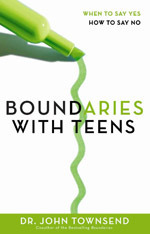 Learn more ways to help your teen grow into a mature, responsible adult by reading Boundaries with Teens by Dr. John Townsend.
Learn more ways to help your teen grow into a mature, responsible adult by reading Boundaries with Teens by Dr. John Townsend.
The post Why Teens Should Get Angry with Parents appeared first on Boundaries Books.
May 30, 2017
The Power of Painful Consequences
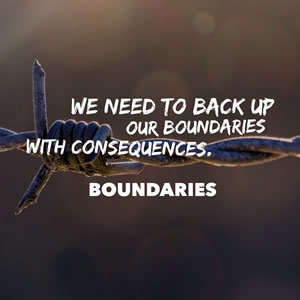 Trespassing on other people’s property carries consequences. A “No Trespassing” sign usually carries a threat of prosecution if someone steps over the boundaries. The Bible teaches this principle over and over, saying that if we walk one way, this will happen, and if we walk another way, something else will happen.
Trespassing on other people’s property carries consequences. A “No Trespassing” sign usually carries a threat of prosecution if someone steps over the boundaries. The Bible teaches this principle over and over, saying that if we walk one way, this will happen, and if we walk another way, something else will happen.
Just as the Bible sets consequences for certain behaviors, we need to back up our boundaries with consequences. How many marriages could have been saved if one spouse had followed through with the threat of “if you don’t stop drinking” (or “coming home at midnight,” or “hitting me,” or “yelling at the kids”), I will leave until you get some treatment!” Or how many young adults’ lives would have been turned around if their parents had followed through with their threat of “no more money if you quit another job without having further employment” or “no bed if you continue to smoke marijuana in my house.”
The Apostle Paul is not kidding in 2 Thessalonians 3:10 when he says that “if anyone will not work, don’t let him or her eat.” God does not enable irresponsible behavior. Hunger is a consequence of laziness (Proverbs 16:26).
Consequences give some “barbs” to fences. They let people know the seriousness of the trespass and the seriousness of our respect for ourselves. This teaches them that our commitment to living according to helpful values is something we hold dear and will fight to protect and guard.
Question for Reflection:
Do you find it difficult or easy to set or maintain consequences with others when they “trespass”onto your emotional or relational property? Why or why not?
________
Boundaries is available for small groups! Looking for a great resource to use with your church small group, Sunday School class, or local Bible study? Check out these four powerful small group studies based on the Boundaries material.
The post The Power of Painful Consequences appeared first on Boundaries Books.
May 22, 2017
Love Only Exists Where There Is Freedom
 “His irresponsibility is making my life miserable,” Jen began. She then went on to tell me (Dr. Townsend) a terrible story of how her husband had successfully avoided adulthood for many years at her expense. She had suffered greatly at the hands of his behavior, both financially and sexually.
“His irresponsibility is making my life miserable,” Jen began. She then went on to tell me (Dr. Townsend) a terrible story of how her husband had successfully avoided adulthood for many years at her expense. She had suffered greatly at the hands of his behavior, both financially and sexually.
As I listened, though, I could see that her deep sense of hopelessness kept her in prison. I could see countless ways she could be free from her husband’s patterns of behavior. She could make numerous choices to help both herself and the relationship. But the sad thing was that she could not see the same choices that were so clear to me.
“Why don’t you stop paying for his mistakes and bailing him out? Why do you keep rescuing him from the messes he gets himself into?” I asked.
“What are you talking about?” Jen asked, alternating between muffled sobs and a scornful expression. “There’s nothing I can do. This is the way he is, and I just have to live with it.”
I could not tell if she was sad about what she perceived as a hopeless case or angry with me for suggesting she had choices. As we talked further, I discovered an underlying problem that kept Jen from making such choices.
She did not experience herself as a free agent. It never occurred to her that she had the freedom to respond, to make choices, to limit the ways his behavior affected her. She felt that she was a victim of whatever he did or did not do.
God designed the entire creation for freedom. We were not meant to be enslaved by each other; we were meant to love each other freely. God designed us to have freedom of choice as we responded to life, to other people, to God, and to ourselves. But when we turned from God, we lost our freedom. We became enslaved to sin, to self-centeredness, to other people, to guilt, and to a whole host of other dynamics. She did not experience herself as a free agent. It never occurred to her that she had the freedom to respond, to make choices, to limit the ways his behavior affected her.
Boundaries help us to realize our freedom once again. Listen to the way that Paul tells the Galatians to set boundaries against any type of control and become free: “It was for freedom that Christ set us free; therefore keep standing firm and do not be subject again to a yoke of slavery” (see Galatians 5:1). Jen felt herself enslaved by her husband’s patterns of behavior and did not see the choices available to her. But God tells us to not be subject to any kind of enslaving control at all.
For love to work, each spouse has to realize his or her freedom. And boundaries help define the freedom we have and the freedom we do not have. Marriage is not slavery. It is based on a love relationship deeply rooted in freedom. Each partner is free from the other and therefore free to love the other. Where there is control, or perception of control, there is not love. Love only exists where there is freedom.
________
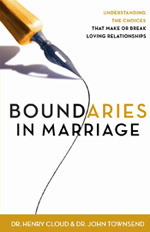 For more helpful advice to enhance your marriage, read the award-winning book, Boundaries in Marriage, by Drs. Henry Cloud and John Townsend.
For more helpful advice to enhance your marriage, read the award-winning book, Boundaries in Marriage, by Drs. Henry Cloud and John Townsend.
The post Love Only Exists Where There Is Freedom appeared first on Boundaries Books.
May 16, 2017
Boundaries Protect, But They Also Do This
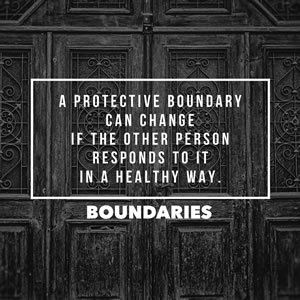 To see how setting limits plays out in relationships, it’s important to understand that there are two types of boundaries – defining boundaries and protective boundaries. Each kind of boundary has a distinct purpose. It’s important that you learn the difference, because defining should become permanent in your life, while protective boundaries are the ones you can move “beyond.”
To see how setting limits plays out in relationships, it’s important to understand that there are two types of boundaries – defining boundaries and protective boundaries. Each kind of boundary has a distinct purpose. It’s important that you learn the difference, because defining should become permanent in your life, while protective boundaries are the ones you can move “beyond.”
Defining boundaries are values that establish who you are and who you are not. They are at the core of your identity and reflect what you believe is important and valuable in life. Here are a few examples:
I follow God and his ways and will always live my life in him.
I love my family and friends, and I will treat them with grace and truth.
I know my mission and purpose in life, and I will not divert from it.
I say and receive the truth; I’m neither silent in saying it nor defensive in receiving it.
These defining boundaries help you and others know the real you, the person who has substance and stands for things that matter. They help guide your decisions and directions in life. Here are some examples of how defining boundaries might be used in your relationships:
“I’m looking for a position that fits my strategic abilities rather than one that is in operations.”
“We have a rule that all who live in this house go to church.”
“I want to hear the truth from you about how you think we are doing in our relationship.”
“I’m a night owl, so let’s not plan something that requires that we get up at, oh, dark thirty.”
This is simply how you tell people who you are and how they tell you who they are. You clarify and define yourselves with these sorts of boundaries.
Protective boundaries are different. They are designed to “guard your heart” (see Proverbs 4:23), and your life, from danger or trouble. There are times when you must protect your values, emotions, gifts, time, and energy from people and situations that may waste or injure them. Protective boundaries have several elements to them. You have to face the reality that talking hasn’t fixed a situation, and you have to set a limit.
A protective boundary might begin with a statement like this: “I want us to work this out, but nothing I’ve said has made any difference, so I’m taking a different route.” This affirms that you value the relationship and that you want the other person to understand that your actions are not punitive but, ultimately, redemptive. You are simply trying to solve a difficulty in the relationship with your protective boundaries.
The consequences portion of the boundary then needs to be stated in an “If . . . then . . .” form to make sure the other person understands you mean business. For example, consider the following statements:
“If you continue being thirty minutes late to events, I will take a separate car.”
”I need a better work ethic from you in the office, or we’ll have to make some changes.”
“If you keep spending over our budget, I will cut up the credit cards.”
“I can’t lend you any more money until I see you making serious efforts to find a job.”
“I want to bring your grandkids to see you, but if you just surf the Web while we’re there, it’s not worth it to come.”
“I want to see my grandkids at times when you don’t need a babysitter; otherwise I feel taken advantage of.”
“If you won’t stop drinking too much or using drugs, I will take the kids and move out.”
Here’s the important distinction between a defining boundary and a protective boundary. A defining boundary is forever and unchangeable, part of what makes you “you”; a protective boundary can change if the other person responds to it in a healthy way. Your defining boundaries mean that, for example, you will always follow God, love people, be committed to personal and spiritual growth, and so forth.
These are the core parts of you, and you don’t change them. But you might change a protective boundary if the other person understands what they are doing to you and makes a significant change. Then you might lessen or end the consequence: no separate cars, no making changes, reissue the credit cards, and so forth. When the change happens, you no longer need the protection.
________
 Ready to go deeper on this topic? Discover how to set healthy limits in any situation and prevent unnecessary burdens from controlling your peace and energy in the New York Times bestselling book, Boundaries.
Ready to go deeper on this topic? Discover how to set healthy limits in any situation and prevent unnecessary burdens from controlling your peace and energy in the New York Times bestselling book, Boundaries.
The post Boundaries Protect, But They Also Do This appeared first on Boundaries Books.
May 9, 2017
Love Is as Love Does
 George sat in my (Dr. Cloud’s) office, despondent. His wife, Janet, whom he loved deeply, had just moved out because he had lost another job. A very talented person, George seemed to have everything he needed for success. But he had lost several good jobs because of his irresponsibility and inability to follow through. Bosses loved the talent but hated the performance. And after several family disruptions because of his failures, Janet had had enough.
George sat in my (Dr. Cloud’s) office, despondent. His wife, Janet, whom he loved deeply, had just moved out because he had lost another job. A very talented person, George seemed to have everything he needed for success. But he had lost several good jobs because of his irresponsibility and inability to follow through. Bosses loved the talent but hated the performance. And after several family disruptions because of his failures, Janet had had enough.
“I love her so much,” George said to me. “Doesn’t she see that?”
“I believe that you love her,” I said. “But in reality, I don’t think that she does. All she sees is the effect your behavior has had on her and the children, and she asks herself, ‘How can he love us and treat us this way?’ You cannot just love someone and not deliver. Love without the fruits of love is really not love in the end. She feels very unloved because of what you have put her through.”
If George was to have a chance of winning Janet back, it would not come through one more empty promise. He needed to develop boundaries to gain the self-control that would make him a responsible person. Janet was only going to believe in action, not just talk about love.
George had never been required to deliver the fruits of love when growing up. His parents were fine, hardworking people. But having gone through the Depression and a lifetime of hard work, they did not want George to have to struggle as they had. As a result, they indulged him and required very little work from him.
When they did give him chores and responsibilities and he did not deliver, they would not discipline him, thinking that they wanted him to have “positive self-esteem” rather than the “guilt” with which they grew up. Consequently, he did not see any negative effect on his loved ones when he did not perform.
But marriage was different. He was now in a relationship in which the one he loved also had requirements for him, and things were falling apart. For George to become a truly loving person, one whose love actually made a difference in the lives of others, he was going to have to become a responsible person. In the end, love is as love does.
Loving people respect the boundaries of others. Have you ever been in a relationship with a person who could not hear the word no? How did you feel? Typically one feels controlled, manipulated, and resentful instead of respected and loved. A controlling person steps over the line and tries to possess the other. This does not feel very loving, no matter how much the offender says he cares.
Loving people are able to control their impulses. Many alcoholics, for example, have great love for their families. Their drinking greatly troubles them, and they feel horrendous guilt. But still they drink, and although, like George, they love, the effects of their lack of ability to say no to alcohol ends up destroying the relationships they care about. Many other impulse problems—such as sexual acting out, overspending, food or drug abuse, and rage attacks—end up destroying love as well. A lack of boundaries keeps these behaviors going.
________
 Ready to go deeper on this topic? Discover how to set healthy limits in any situation and prevent unnecessary burdens from controlling your peace and energy in The New York Times bestselling book, Boundaries.
Ready to go deeper on this topic? Discover how to set healthy limits in any situation and prevent unnecessary burdens from controlling your peace and energy in The New York Times bestselling book, Boundaries.
The post Love Is as Love Does appeared first on Boundaries Books.
May 1, 2017
Boundaries Back at You — How to Set Limits on Yourself
 Sarah had been working on major boundaries issues in her therapy for a while now. She was seeing progress in resolving responsibility conflicts with her parents, her husband, and her kids. Yet today she introduced a new issue.
Sarah had been working on major boundaries issues in her therapy for a while now. She was seeing progress in resolving responsibility conflicts with her parents, her husband, and her kids. Yet today she introduced a new issue.
“I haven’t told you about this relationship before, though I guess I should have. I have tremendous boundary problems with this woman. She eats too much, and has an attacking tongue. She’s undependable — lets me down all the time. And she’s spent money of mine and hasn’t paid me back in years.”
“Why haven’t you mentioned her before?” I asked.
“Because she’s me,” Sarah replied.
Sarah was echoing the conflict most of us have. We learn that boundaries are biblical. We begin setting limits on others. We begin moving from taking too much responsibility to taking just enough. But how do we begin to set limits on ourselves?
Instead of looking at the control and manipulation of others, we also need to be looking at our responsibility to control our internal boundary conflicts. This can get a little touchy. But, instead of a defensive posture, we are much better off to look humbly at ourselves. To ask for feedback from others. To listen to people we trust. And to confess, “I was wrong.”
Since the Fall, our instincts have been to withdraw from relationship when we’re in trouble, when we most need other people. (Remember how Adam and Eve hid from God after they ate the forbidden fruit?) Due to our lack of security, our loss of grace, our shame, and our pride, we turn inward, rather than outward, when we’re in trouble. And that’s a problem. As Ecclesiastes 4:10 puts it, “Woe to one who is alone and falls and does not have another to help.”
Such withdrawal happens in our program time after time. For the first time, hurting people come forth with their need for connection. Like a rose lifting its petals after a hard rain, they begin to relate and connect in the light of the grace of God and his people. Then an unexpected setback will occur. Instead of bringing the painful and frightening feelings and problems to their newfound relationships, these people will often retreat to work out the problem alone.
It is only when this attempt at a solution breaks down that they finally realize that these spiritual pains and burdens need to be brought out of themselves to the body of Christ. Truly every person needs to feel very secure before she will risk taking her spiritual and emotional problems to other people.
And yet the Bible doesn’t recognize any other answer to our problems. Grace must come from the outside of ourselves to be useful and healing. Just as the branch withers without the vine, we can sustain neither life nor emotional repair without bonding to God and others. God and his people are the fuel, the energy source from which any problem is addressed.
Whether our boundaries issue is food, substances, sex, time, projects, the tongue, or money, we can’t solve it in a vacuum. If we could, we would. But the more we isolate ourselves, the harder our struggle becomes. Just like an untreated cancer can become life-threatening in a short time, self-boundary problems will worsen with increased aloneness. We need to the body of Christ to heal and to grow up.
________
 Ready to go deeper on this topic? Discover how to set healthy limits in any situation and prevent unnecessary burdens from controlling your peace and energy in the award-winning book, Boundaries.
Ready to go deeper on this topic? Discover how to set healthy limits in any situation and prevent unnecessary burdens from controlling your peace and energy in the award-winning book, Boundaries.
The post Boundaries Back at You — How to Set Limits on Yourself appeared first on Boundaries Books.
Boundaries Back At You — How to Set Limits on Yourself
 Sarah had been working on major boundaries issues in her therapy for a while now. She was seeing progress in resolving responsibility conflicts with her parents, her husband, and her kids. Yet today she introduced a new issue.
Sarah had been working on major boundaries issues in her therapy for a while now. She was seeing progress in resolving responsibility conflicts with her parents, her husband, and her kids. Yet today she introduced a new issue.
“I haven’t told you about this relationship before, though I guess I should have. I have tremendous boundary problems with this woman. She eats too much, and has an attacking tongue. She’s undependable — lets me down all the time. And she’s spent money of mine and hasn’t paid me back in years.”
“Why haven’t you mentioned her before?” I asked.
“Because she’s me,” Sarah replied.
Sarah was echoing the conflict most of us have. We learn that boundaries are biblical. We begin setting limits on others. We begin moving from taking too much responsibility to taking just enough. But how do we begin to set limits on ourselves?
Instead of looking at the control and manipulation of others, we also need to be looking at our responsibility to control our internal boundary conflicts. This can get a little touchy. But, instead of a defensive posture, we are much better off to look humbly at ourselves. To ask for feedback from others. To listen to people we trust. And to confess, “I was wrong.”
Since the Fall, our instincts have been to withdraw from relationship when we’re in trouble, when we most need other people. (Remember how Adam and Eve hid from God after they ate the forbidden fruit?) Due to our lack of security, our loss of grace, our shame, and our pride, we turn inward, rather than outward, when we’re in trouble. And that’s a problem. As Ecclesiastes 4:10 puts it, “Woe to one who is alone and falls and does not have another to help.”
Such withdrawal happens in our program time after time. For the first time, hurting people come forth with their need for connection. Like a rose lifting its petals after a hard rain, they begin to relate and connect in the light of the grace of God and his people. Then an unexpected setback will occur. Instead of bringing the painful and frightening feelings and problems to their newfound relationships, these people will often retreat to work out the problem alone.
It is only when this attempt at a solution breaks down that they finally realize that these spiritual pains and burdens need to be brought out of themselves to the body of Christ. Truly every person needs to feel very secure before she will risk taking her spiritual and emotional problems to other people.
And yet the Bible doesn’t recognize any other answer to our problems. Grace must come from the outside of ourselves to be useful and healing. Just as the branch withers without the vine, we can sustain neither life nor emotional repair without bonding to God and others. God and his people are the fuel, the energy source from which any problem is addressed.
Whether our boundaries issue is food, substances, sex, time, projects, the tongue, or money, we can’t solve it in a vacuum. If we could, we would. But the more we isolate ourselves, the harder our struggle becomes. Just like an untreated cancer can become life-threatening in a short time, self-boundary problems will worsen with increased aloneness. We need to the body of Christ to heal and to grow up.
________
 Ready to go deeper on this topic? Discover how to set healthy limits in any situation and prevent unnecessary burdens from controlling your peace and energy in the award-winning book, Boundaries.
Ready to go deeper on this topic? Discover how to set healthy limits in any situation and prevent unnecessary burdens from controlling your peace and energy in the award-winning book, Boundaries.
The post Boundaries Back At You — How to Set Limits on Yourself appeared first on Boundaries Books.
April 10, 2017
Why Do Nice People Attract Jerks?
 The question that many people wonder is “If I’m nice, then why do I keep attracting such jerks?” They think that something is inherently wrong with them, and sometimes they can begin to get quite hopeless over their chances of finding good friends, someone good to date, or building a great marriage.
The question that many people wonder is “If I’m nice, then why do I keep attracting such jerks?” They think that something is inherently wrong with them, and sometimes they can begin to get quite hopeless over their chances of finding good friends, someone good to date, or building a great marriage.
The key to remember is that the reason why nice people attract jerks is that they are too adaptive in the beginning. If that person had had boundaries, the problem never would have happened. Or if it did, the problem would have been fixed first.
People who are selfish and controlling can only be that way if they are in relationship with someone who is adaptive. If someone stands up to them and is honest about his or her wants and desires, then the controlling person has to learn to share or gets frustrated and goes away. Take these steps to avoid ending up in relationships that attract unhealthy people:
Be honest about your preferences and desires.
Don’t act like you like things other people like just so that you will be accepted.
Being liked for who you are requires that you be that person.
Tell the truth about where you want to go and not go, or what you want to do or not do.
Don’t be afraid to share your desires and wants for fear of conflict. Find out early if you are with someone who can share equally.
Get feedback from honest friends to tell you if you are really being yourself and seeing the relationship realistically.
Remember with each decision that you make you are giving the other person an impression of what you like in life and in a relationship. Be careful—he or she might believe you.
When you give or serve, let it be honest and purposeful.
You are a person, and you cannot go throughout life without pursuing your own wishes, needs, and desires, nor should you. Your needs and desires are going to come out, and you had better find out early in a relationship where the person really stands with the idea of sometimes having to adapt to them. You don’t want to be telling some counselor the following things ten years from now:
She seems to have to have her way.
I am afraid to let my real feelings and desires be known.
We have so much conflict over such little things.
We always spend our money on what he wants.
She doesn’t care about me and what I want.
Why can’t he ever go to the places that I want to go to?
Issues like these are usually discovered later in a relationship where one person has adapted for a long time, and then tries to make a change. The lesson is to be yourself from the beginning, and then you can find someone who is authentic as well. A relationship like that has mutuality and partnership. It has give and take. It has equality. It has sharing and mutual self-sacrifice for the sake of the other and the relationship.
If you are a real person from the start, a relationship of mutuality has a chance of developing. If you are not, then you might be headed for trouble.
The little things in life are where you can spot the big things. If you are with a self-centered person who cannot give to your desires, you will find out soon enough by being honest and straightforward about simple things, for that is where day-to-day life is lived. You will quickly find out if you are with someone who is able to share, or someone who has to have his or her way all the time. This knowledge will be helpful now and essential for the future.
________
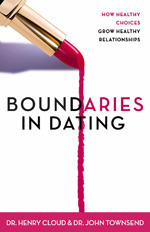 Get more helpful advice to build the best dating relationship and find the love of your life by reading Boundaries in Dating.
Get more helpful advice to build the best dating relationship and find the love of your life by reading Boundaries in Dating.
The post Why Do Nice People Attract Jerks? appeared first on Boundaries Books.
April 4, 2017
Boundaries Let the Good in and Keep the Bad Out
 Boundaries help us to distinguish our property so that we can take care of it. They help us to “guard our heart with all diligence.” We need to keep things that will nurture us inside our fences and keep things that will harm us outside. In short, boundaries help us keep the good in and the bad out. They guard our treasures (Matt. 7:6) so that people will not steal them. They keep the pearls inside, and the pigs outside.
Boundaries help us to distinguish our property so that we can take care of it. They help us to “guard our heart with all diligence.” We need to keep things that will nurture us inside our fences and keep things that will harm us outside. In short, boundaries help us keep the good in and the bad out. They guard our treasures (Matt. 7:6) so that people will not steal them. They keep the pearls inside, and the pigs outside.
Sometimes, we have bad on the inside and good on the outside. In these instances, we need to be able to open up our boundaries to let the good in and the bad out. In other words, our fences need gates in them. For example, if I find that I have some pain or sin within, I need to open up and communicate it to God and others, so that I can be healed. Confessing pain and sin helps to “get it out” so that it does not continue to poison me on the inside (1 John 1:9; James 5:16; Mark 7:21 – 23).
And when the good is on the outside, we need to open our gates and “let it in.” Jesus speaks of this phenomenon in “receiving” him and his truth (Rev. 3:20; John 1:12). Other people have good things to give us, and we need to “open up to them” (2 Cor. 6:11 – 13). Often we will close our boundaries to good things from others, staying in a state of deprivation.
In short, boundaries are not walls. The Bible does not say that we are to be “walled off” from others; in fact, it says that we are to be “one” with them (see John 17:11). We are to be in community with them. But in every community, all members have their own space and property. The important thing is that property lines be permeable enough to allow passing and strong enough to keep out danger.
Often, when people are abused while growing up, they reverse the function of boundaries and keep the bad in and the good out. When Mary was growing up she suffered abuse from her father. She was not encouraged to develop good boundaries. As a result, she would close herself off, holding the pain inside; she would not open up to express her hurt and get it out of her soul. She also would not open up to let support from the outside in to heal her. In addition, she would continually allow others to “dump” more pain into her soul. Consequently, when she came in for help, she was carrying a lot of pain, still being abused, and “walled off” from support from the outside.
She had to reverse the ways her boundaries worked. She needed fences that were strong enough to keep the bad out and gates in those fences to let out the bad already in her soul and let in the good she desperately needed.
________
From Boundaries by Dr. Henry Cloud and Dr. John Townsend. Click here to learn more about this New York Times bestseller.
The post Boundaries Let the Good in and Keep the Bad Out appeared first on Boundaries Books.
March 28, 2017
My Teen Is on Drugs. What Can I Do?
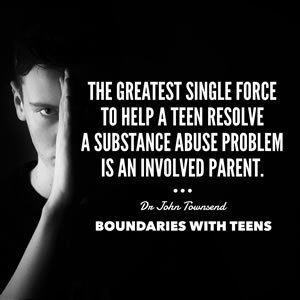 It’s every parent’s nightmare: having a teen on drugs. This is not life as God designed it. Substance abuse causes the breakdown of all that is good. Enslavement replaces freedom. Detachment replaces love. Chaos replaces order. Despair replaces hope.
It’s every parent’s nightmare: having a teen on drugs. This is not life as God designed it. Substance abuse causes the breakdown of all that is good. Enslavement replaces freedom. Detachment replaces love. Chaos replaces order. Despair replaces hope.
Many young people abuse alcohol and drugs, and this problem is not likely to go away anytime soon. I (Dr. Townsend) can’t overstate the danger of substance abuse. It can, and often does, lead to poverty, injury, disease, and death.
But despite the seriousness of this problem, parents of teens with this issue need to understand that the greatest single force to help a teen resolve a substance problem is an involved parent. What follows are some guidelines for the process.
Defining the Problem
Unfortunately, the teen years are a perfect fit, in a sick way, for substance abuse problems. By nature, adolescents challenge the authority and values of parents and are highly susceptible to peer approval.
They are interested in feelings and experiences, often to the neglect of good judgment, yet they can quickly become disconnected and can feel isolation deeply. Teens get easily bruised, discouraged, and hurt, and they gravitate toward quick ways to medicate the pain. No wonder the issue has become so far-reaching, particularly now that drugs are so accessible.
And they are accessible. Your teen likely knows how to get drugs if he wants them. He knows someone, or knows someone who knows someone. Be wise. Keep your head out of the sand and assume your teen has access.
If you accept this reality, it can assist you in helping your teen stay away from alcohol and drugs or in helping him recover from them.
Handling the Problem
You can’t control whether your teen has access to drugs and alcohol, but you can support him and help him develop the internal restraints and strength he needs to resist using substances. Here are some ways to do just that.
Establish a zero tolerance policy. Be clear with your teen that substances are not acceptable and that you will not tolerate them. Your adolescent may be hearing muddy messages from lots of other sources, including friends and some of their parents. This is a black-and-white issue, not a gray one, so be direct about your stance on alcohol and drugs.
Not only should you be forthright about your stance, but also about the consequences. Let your adolescent know ahead of time that if she uses drugs or alcohol, she will lose many valued privileges and freedoms. Not only that, but if your teen continues to use, she will have to live somewhere else, because you have a value that substance abuse will not be tolerated in your home.
I know parents who have sent their teens to a different high school to get away from drug-using friends. I know some who have sent their kids to boarding schools. Others have sent their kids to residential treatment centers. And still others have done everything they could until the teen reached majority age, and then they made her move out of the house. Many times, this was absolutely the right move to make. Such consequences may sound harsh, but only to those who are not experienced in the power and severity of drug problems. Substances are stronger than many people think, and their hold gets worse over time.
Come down hard at the first offense. If it is your teen’s first offense, resist the impulse to say, “Oh well, first time, just don’t do it again.” You will have only one first offense to deal with, and it is an opportunity to let your teen know that drugs and alcohol are not a casual deal. Otherwise, your teen may think it’s acceptable for him to use now and then.
Here are five suggestions for consequences:
Grounding. Grounding is a natural consequence, as your teen has shown that she can’t resist temptation with her friends, so she can’t have social contact with them for a significant period of time.
Supervised social contact. Allow your teen to go to social outings, including movies and parties, but only with an approved parent present. If he does not use substances during this period, he can then have more social freedom.
Drug testing. Home drug tests are now readily available. You can tell your teen that for the next few months you will be testing her randomly. A side benefit is that this also gives your teen an excuse not to use with friends. She can say, “I can’t smoke pot. My parents do random testing.”
Legal education. Some counties offer training for families in which they take teens through the court system as if they were going to jail, so that they can experience what the system would be like were they to be arrested and tried on a drug charge.
Service. Have your teen help out at the local rescue mission or church, doing errands, stocking the warehouse, or cleaning up. Learning the value of service often helps adolescents become open to the needs of others and can help break the self-absorption of substance use.
Live in the Light
Our natural inclination as parents is to give our kids the information on the dangers of drugs and then hope they make good choices. But this is not enough. While your teen needs the information, she also needs you. She is not likely to say, “Would you ask me if I’m on drugs or not?” So be the parent and ask. Teens often hope on some level that their parents will ask, because they are scared and want to talk, but they are not about to ask a parent. Take the initiative to bring out drug matters into the light of relationship.
Listen when your teen talks. Try to get to the heart of what she understands, experiences, does, and feels. If you can’t be shocked, you will be more likely to get more information. Your teen needs your viewpoint, but she also needs your ears.
Sometimes parents avoid talking about alcohol and drugs beyond the basic “don’t do it” lecture. They think they might convey approval to the teen if they act interested in what is going on with friends and at school. Nothing could be further from the truth. Your teen is living in a drug-influenced world, whether or not she is using them. Don’t leave her alone in that world. Enter it, be curious about it, and get to know it. Find out what kids are using and where, which parents are lax about substances, and where the parties are. Your involvement doesn’t mean that you approve of drugs. It simply means you love your kid enough to get into her world.
Of course, being connected means more than talking about drugs. It involves being in an ongoing relationship with your teen about all aspects of her life. The more you connect on all levels, the more likely your teen will talk with you about any substance problem.
Know Your Teen
The better you know your adolescent, the better you will know how to respond to substance problems. Get to know what vulnerabilities are particular to your teen that drugs and alcohol might exploit, and get your teen the support, assistance, and structure he needs so that he is not so susceptible. Here are some common vulnerabilities and ways you can deal with them:
She challenges your parenting and values. Find ways to have her safely question you that don’t involve substances. Give her room and space to not be your clone.
He surrenders judgment to feelings and experiences. Spend time talking with him about that. Validate his need for experience, but help him develop the ability to make sound decisions, to think about the effects of his actions, and to postpone gratification for a greater good.
She is easily influenced by the approval of peers. Strengthen her individuality and character. Help her to say no to others, including you. Find healthy peers who will support her in this effort.
He is vulnerable to others. Have him make you the bad guy until he is stronger. For example, your teen may not be able to say, “No, I don’t do drugs,” but he can say, “My parents are really strict, and they would come down so hard on me if I did that.” Not only is this statement true, but it gives your kid an out until he is firmer in his own values.
She disconnects and isolates quickly. Take initiative and draw her out. Be a bridge between your teen and her feelings, between herself and the world. Help her reconnect so that she doesn’t need substances to feel alive.
He is easily hurt and is vulnerable to attempts to cover up his pain. Comfort and support your teen so that he can connect his hurt feelings to you so that they are less intense. At the same time, help him learn to confront and be honest with others so that he is stronger inside and less vulnerable.
More than ever before, your teen needs you to know who he is. Find out what he needs, what hurts him, and what matters to him. He may resist you, but part of him wants his parent to break through at some level so that he is not alone with himself.
Remember the Druggies
In all likelihood, you were around drugs or at least had friends who were druggies when you were a teenager. Remember what potential they had? Some were smart, funny, creative, and gifted. Now think about where many of those people are today. Is that what you want for your teen’s future? If your child’s present is substance-influenced, it can easily become a substance-dominated future.
Seek Help
If your teen is using alcohol or drugs, seek help. This complex problem requires much expertise, skill, and training. Fortunately, there are good counselors and teen workers who are well trained in substance problems. A good adolescent therapist can evaluate the severity of the problem and determine what structures will help the teen, ranging from counseling to an intensive detox and rehab program.
If your teen’s drug and alcohol usage has moved beyond experimentation and become a regular part of her life, she now has a dependency. She now uses substances compulsively, no matter how negative the life consequences have become. She cannot stop on her own and will need outside support and expertise.
Watch Out for Other Types of Dependency
Dependencies are not limited to drugs and alcohol. A teen can become a sex addict, for example, from viewing pornographic websites, and be trapped in compulsive behaviors that keep him returning to the sexual images.
These teens feel intense shame, guilt, and helplessness about their porn addictions. Youth pastors and counselors can do much to help kids deal with this issue.
In addition, some teens also have food dependencies known as eating disorders, such as anorexia, bulimia, and obesity. In such instances, eating habits and food intake become the focus of life, sometimes to the point of being life-threatening. Teens with these dependencies can make good progress in resolving them when they receive competent help.
You Can Do It!
Be proactive, informed, and involved. The sooner you deal with your teen’s abuse of alcohol, drugs, sex, or food, the more likely your teen will get back on the road to a healthy life. Your involvement can save your child’s life.
________
 Read more about how to handle hot button topics effectively with a teen son or daughter in Boundaries with Teens.
Read more about how to handle hot button topics effectively with a teen son or daughter in Boundaries with Teens.
The post My Teen Is on Drugs. What Can I Do? appeared first on Boundaries Books.




